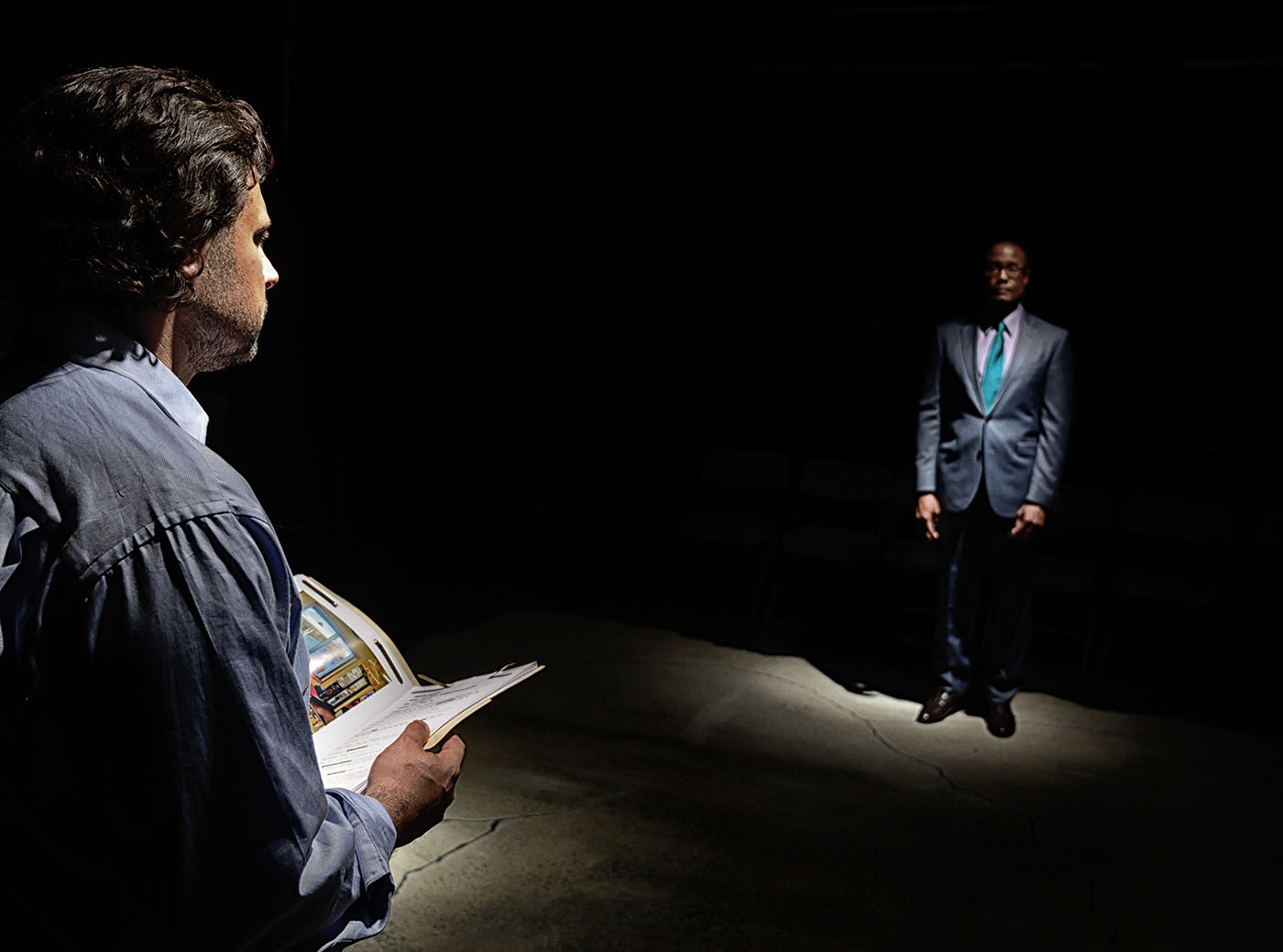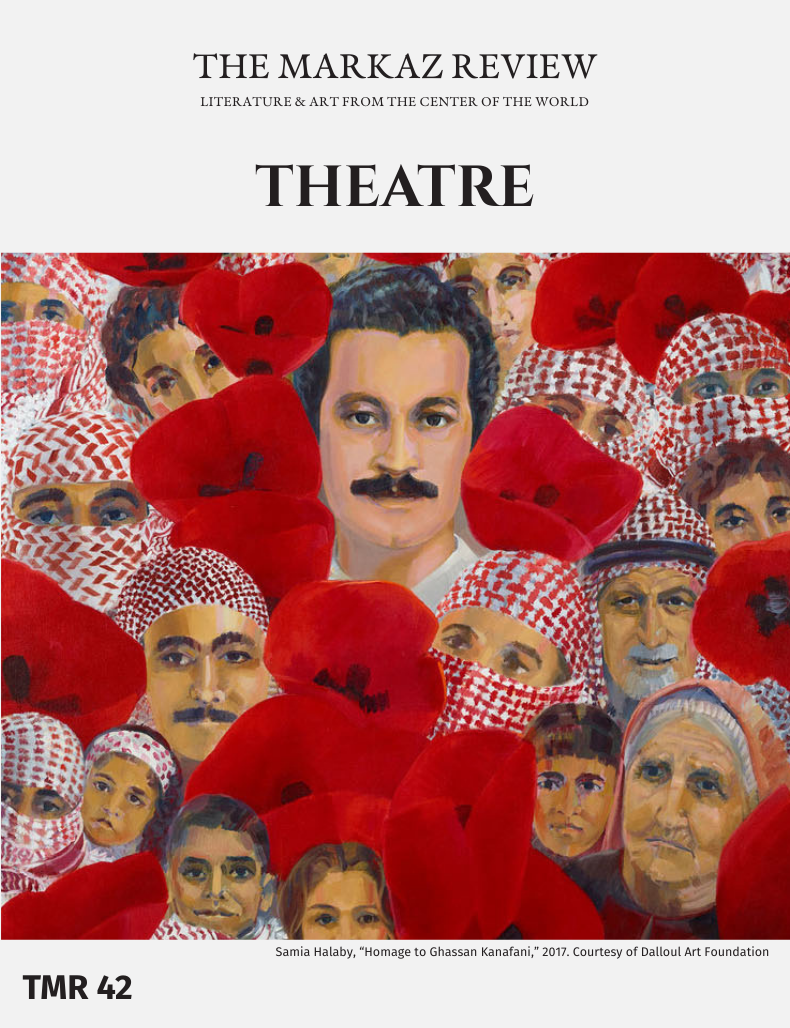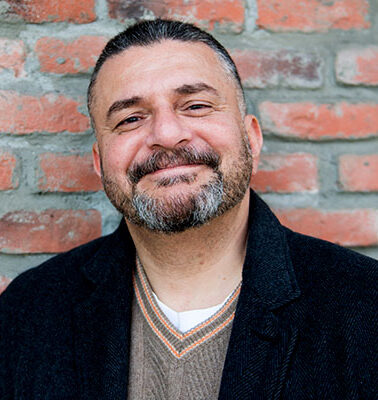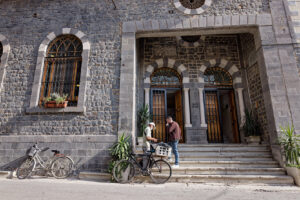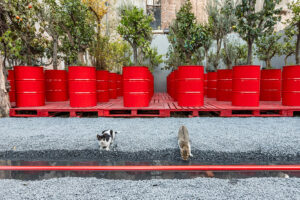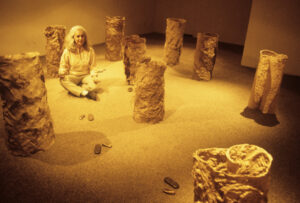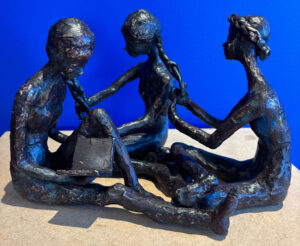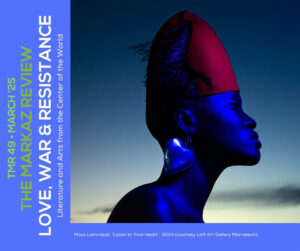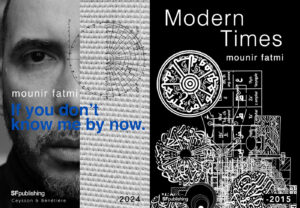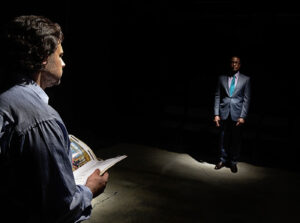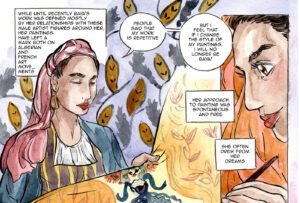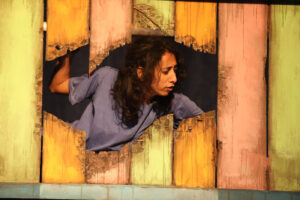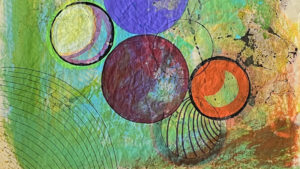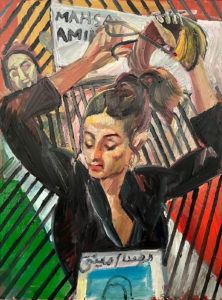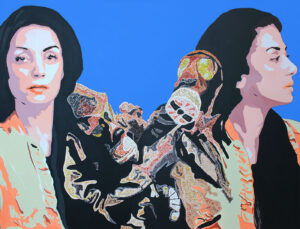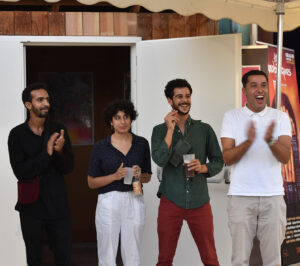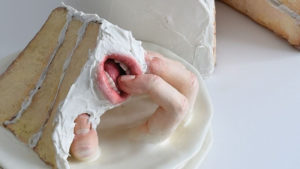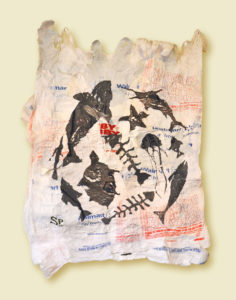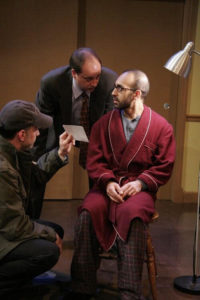Do words matter? Can art stop a war? Is it ludicrous to imagine that a playwright could conjur dialogue and drama that will move hearts and minds to change the world?
(Something from Beethoven, or some other classical composer is played. Lights on Hisham. He listens for a couple of beats, then:)
HISHAM
(To audience.)
This isn’t to numb. Or to shut down. This is to appreciate. Listen…
I take it in and swim in the notes of the music. I imagine my body floating in the flow of the music and conjure up a river, at night. I am floating in its currents. I look up and imagine stars. I am safe and held in the music. I will not sink nor drown. The music is my floating device. It carries and relieves me of gravity until I can stand again the weight of things. Until I can stand again the weight of my own thoughts.
I go into the kitchen and make a sandwich. Turkey, cheese, mayo, sourdough. Let’s add butter. Tomato has texture. Lettuce adds little but we’ll throw it in anyway because that’s what a proper sandwich includes, lettuce. I realize I’ve never given lettuce much thought. Have I? All these things that become food that were never food before someone thought “I think I’ll give this a go.” And then suddenly it catches fire. Eating lettuce becomes the latest craze. And here we are centuries later in my kitchen making sandwiches with it. I pick it up, this well-made sandwich, then put it back on the plate understanding it has failed me even before I take the first bite. I need something more immediate. Chips. I open a bag. Fat, salt, crunch. I eat chips. I love the sound of broken bits in my mouth getting smashed by my recently cleaned teeth. The sound alone drowns out just enough as I float along on the music and pleasure of my taste buds.
(We hear the sound of chips being eaten over the music of Beethoven.)
Have I ever looked in the mirror to see what masticated chips look like? Let’s have a look.
(Projected: an image of Hisham’s open mouth with half-chewed chips.)
You wouldn’t want a visual of that while eating would you? Imagine if you were forced to see your mouth in operation while eating. We wouldn’t be able to swallow a thing, unless you have a taste for the gore of food being pulverized and turned into mush.
I have to stop staring. Then again if I stare at this, I won’t have to stare at anything else. The stars — where’d they go — they seem to have lost themselves in all that wasteland up there.
Let’s look at art instead.
“Instead of,” because this is what all this is about: “avoidance.” Or maybe not. Art does do actual good sometimes, doesn’t it? It uplifts, it pinches you awake. It activates parts of you that might have been asleep for months, years. It can even spoon-feed hard truths in enjoyable ways. Other times it’s boring; art can be boring. But boredom can be very soothing. I will listen to Beethoven, eat my chips and look at art. What shall I look at?
Nobody really brings up the Pre-Raphaelites much, do they.
(Pre-Raphaelite paintings are projected.)
They’re lovely…
Literal, yes, that’s not in fashion, that style, figurative. Abstract is more in, or still in, isn’t it? Or art’s that’s ironic, cheeky. But simply drawn and painted? Brightly lit like these works? Green as green, orange and yellows like this? Bodies wrapped in lush fabrics? No. Better than bodies blown and dipped in shredded concrete.
(In flashes for a few seconds we see victims of war, bloodied and warped. It should be startling, and fast. Spliced in for a second or two.)
Torn apart and buried, the colors of stark red and rose. Not the rose colors we want. Really, not now. We’re doing this so as not to look at that, so…
(Projected: Archibald Wakley’s “The Sleeping Beauty.” Slight beat as he recovers.)
Thank you….Women in gardens. Smelling roses. Surrounded by foliage. I love foliage. Slumbering in the pleasure of nature. Really, look at that. I will park my eyes right here and think of nothing else.
(Slight beat. Mumbles to himself:)
One, two, three, four.
(Normal voice.)
I know nothing about this painting or its subject but what do I need to know? To soak it all in. The details. The overall everything. I’m not even going to analyze the politics of it all: the maleness, the sexism; the British Empire at the time in full swing. The declarations made, or soon to be made that would ravage and bury the dreams of so many who struggled for independence. Now under the thumb of the British who with the flick of their imperial pen
(The sound of a falling bomb is heard. Followed by an explosion. He continues talking over this.)
get to strangle the free will of millions and seed all the wars that we suffer through today. How lovely it must be to have so much power. What can my precious art do against all that? My silly aesthetics, my wobbly imagination that does what exactly in comparison. The labor, the barley funded labor.
(Other Pre-Raphaelite paintings will be projected.)
All this creating something out of nothing, putting that up against even one gun. Now that’s one creation that has impact.
(Again, spliced for just a second, a horrific image of war.)
Putting that work of art against a gem from Lockheed Martin.
(The names of other companies that make weapons can be substituted.)
Crafted engineering, or whatever the terminology used for making weapons, weaponry that does this:
(Another horrific image of war.)
And this:
(Horrific image.)
And this:
(Horrific image.)
The power of art has as much impact as a ball of cotton dropped on someone’s head compared to this piece of engineering.
(Projected: a bomb. Then an endless row of them. Then perhaps pics/ videos of explosions.)
These beauties will touch lives and make you feel stuff. These gems will turn your insides out and blow your mind in ways that art can only dream of doing. Art wishes it could be a player the way this stuff is…I should have been a weapons manufacturer. Really. I’d feel so much more relevant, and useful. Every time there was a news report about a region threatening to break out into war, I’d be like:
(He crosses fingers.)
Yes, please. Would I be sorry the business I’m in would be in demand? Are you kidding me? I’d be high-fiving myself — quietly; publicly of course I’d be shaking my head in sorrow, much like an undertaker who can’t exactly pop the champagne every time a corpse shows up. But privately, oh my God. And how much nicer to be on the side of the bomb makers for a change.
(Different kinds of weaponry are projected.)
Do they have to justify to themselves what they’re doing? Maybe, for a second, they can’t all be sociopaths. But once you’ve done that, once you’ve squared away those pesky doubts about what you do, can you imagine the relief? The release. From all that agonizing over this or that outrage that sensitive softies have to endure. Banished. My whole relationship to the world would be so much lighter. And with conflicts always going on somewhere, I’d be in perfect harmony with the ways of the world. Work, world view, private life, morality: all in sync. Plus those guys go to the best restaurants. They get the best tables. The respect they’re shown when they walk into a room.
Art. What I do. What I consume. What is that? It’s weak. It’s a weak response to the world. It is only good for a distraction. I am trying to distract myself. I should be ashamed for being so desperate to distract myself from all of this.
(Another horrific image of war.)
And this:
(Another horrific image of war.)
And this:
(Another horrific image of war.)
And then: I’m so mortified for being so helpless in the face of all this shit that I have to distract myself from my own uselessness, on top of the horrors I’m seeing, while deluding myself that my futile efforts might still be useful against all evidence that it is most definitely not!
(The image changes to another Pre-Raphaelite painting as the classical music spikes in noise-level for a few seconds…before going back to a more soothing, background sound.)
One, two, three, four.
But….But. What about protest art, you might ask, such as this.
(Projected: Picasso’s “Guernica.”)
I’m asking. We’re going to figure this out together, you and I. You who’ve bothered to show up tonight, theatre lovers, art lovers, we’re going to understand our own worth in the face of all this horror. Or these works:
(Other paintings showing the horrors of war, like Goya’s “Third of May,” are projected.)
Or these:
(More protest art: perhaps Banksy and poster art.)
Or music like this:
(Krzysztof Penderecki’s “Threnody for the Victims of Hiroshima” starts playing. Perhaps the title of the piece is projected as well? This plays for a few beats, then:)
And all the pop songs, the dramas, films and novels, all the works that bleed their hearts out quite openly, without shame, that wear their politics on their sleeves, these, these are the weapons of our humanity. Yes? That speak, that have to speak of what we aspire to be. And claim that aspiration as a thing that punches way above its weight. This is where the pen is mightier than the Lockheed Martins and Raytheons, the Northrop Grummans and Boeings. It’s not immediate. Sure. Rarely if ever immediate, the effect. It’s subtler. Faint. But even so: it does get in there eventually, under the skin, it pricks us somewhere. Kicks us awake from our slumber. Doesn’t it? It makes us go, “Oh, right, slaughter. I should feel something about that. Quick: finger to the wind:
(Raises his finger.)
Other people are outraged too, good, count me in.” And presto: what bled on the fringes now bleeds in our living rooms. And politicians go “Oh we might lose more votes than the money we need from these companies if we don’t vote to stop the carnage that people are unfortunately paying attention to, because of those damn photos and videos that reveal the horrors. Or posts that go viral, or in-your-face poster art that scream at you to open your eyes. All those devastating stories and poems that shoot straight into your heart and wreck it.” And the bestest presto of them all: because of all that the politicians at last vote to stop the slaughter. Ergo: Art wins! It pricked, it nudged, it led to this:
(Projected: a work of protest art. Then of small protests and political placards; and then even larger images or videos of demonstrations, etc.)
and this and this, and boycotts and sanctions and resolutions, all ending in peace and harmony and much goodwill.
Yay.
Pat yourself on the back.
Even if the art wasn’t very good. Even if it was obvious and blunt, never mind. It was effective. Fuck aesthetics. Or maybe it was excellent. Either way it worked. The art I consumed, the art I made: it worked…
Eventually.
Through many twisted pathways…
Many twisted, and probably unrelated pathways that you have to work very hard to link and make the case for…that art had anything to do with ending something as implacable as war. Could play any part, could be an actual force to gum up the machinery. You might have to delude yourself a little, more than a little, that any kind of art actually moved the needle.
It might be more honest just to say that art is just a distraction. And that’s a good all by itself.
If it just gives you breathing room. We can’t always be on that damn spit roasting ourselves over the flames of our own conscience all the time.
So what if art can’t substantially help someone whose back is against a wall, or kneeling, naked, with a gun to their head.
Or…maybe art is unique is just being so thoroughly useless in the face of man’s own disgusting behavior. From polluting the air we breathe, to butchering the people who breathe it. Which is perhaps all the more reason to return to this:
(Another Pre-Raphaelite painting is projected.)
That at least reminds us of what we’re capable of. Right?
Our humanity….Our artistry….Our divinity.
Adorno said: “To write poetry after Auschwitz is an act of barbarism.”
(Slight beat.)
Thank you for coming tonight to my act of barbarism.
(Slight beat. Blackout. End of play.)
**Yussef El Guindi’s plays Pilgrims Musa and Sheri in the New World, Jihad Jones and the Kalashnikov Babes, Such a Beautiful Voice is Sayeda and Karima’s City were published by Dramatists Play Service. Ten Acrobats in an Amazing Leap of Faith, Collaborator, Threesome, The Talented Ones and Hostages were been published by Broadway Play Publishing Inc. Our Enemies: Lively Scenes of Love and Combat appears in the anthology Four Arab American Plays from McFarland Books. Bloomsbury has published Selected Works by Yussef El Guindi.



